Few Muslims have visited the notorious site of some of history’s worst atrocities. But high-ranking leaders of Muslim and Jewish communities are coming together to mark 75 years since the concentration camp’s liberation.
In 2013, the leader of Berlin’s Social Democratic parliamentary group, Raed Saleh, visited the Auschwitz-Birkenau memorial site with a group of pupils. The fact that Saleh, who was born in the West Bank and came to Germany as a 5-year-old, made his way to the site of a former Nazi concentration and extermination camp garnered national attention. At the time, he was Germany’s most prominent Muslim to ever visit the site where Nazis murdered more than 1.1 million people, most of them Jews, during the Holocaust.
On Thursday, the memorial site will be visited by the most senior Muslim figure to date: Sheikh Mohammed al-Eissa, the secretary general of the Muslim World League.
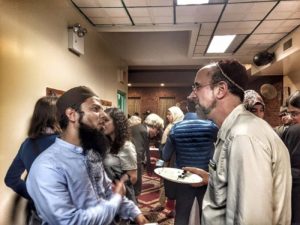 “There was this pupil called Mustafa, a really big guy, standing in front of a vast pile of children’s shoes,” said Saleh, recalling the visit to bloc 5 of Auschwitz-Birkenau camp. “Each pair had once belonged to a child obviously, and suddenly I noticed how this realization did something with Mustafa.” The lawmaker says the pupils in his group had “diverse, multi-religious backgrounds” in Berlin and that “anti-Semitism among young Muslims is not uncommon.”
“There was this pupil called Mustafa, a really big guy, standing in front of a vast pile of children’s shoes,” said Saleh, recalling the visit to bloc 5 of Auschwitz-Birkenau camp. “Each pair had once belonged to a child obviously, and suddenly I noticed how this realization did something with Mustafa.” The lawmaker says the pupils in his group had “diverse, multi-religious backgrounds” in Berlin and that “anti-Semitism among young Muslims is not uncommon.”
Few visitors from Arab world
According to the director of the memorial site, Piotr Cywinski, more than 2.3 million people visited in 2019. Yet he said among these “were only a handful of people from Arab world.” Last year, the museum’s ticket reservation system registered some 3,200 guests from Arab-majority countries, though visitors’ religious affiliations are not recorded. Cywinski said the site also receives Muslims among groups of French, Norwegian, German and other visitors. He is “certain that for all of them, coming to an authentically preserved site of a former camp is an important personal and universal experience.”
Read more: Muslim, Jewish leaders team up in ‘exemplary’ European initiative
On Thursday, the memorial site will be visited by the most senior Muslim figure to date: Sheikh Mohammed al-Eissa, the secretary general of the Muslim World League, who represents over a billion Muslims worldwide. Al-Eissa, who previously served as Saudi justice minister, will make his way to the former camp with David Harris, the director of the American Jewish Committee (AJC). This joint visit by a high-ranking 54-year-old Islamic scholar and a 70-year-old descendant of Holocaust survivors is nothing short of remarkable.
‘Shook humanity to the core’
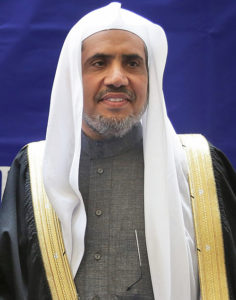
Mohammad Abdulkarim Al-Issa, Secretary-General of the Muslim World League, in New York, Monday, April 29, 2019. (AP Photo/Seth Wenig)
Roughly two years prior to this visit, al-Eissa sent a letter to the United States Holocaust Memorial Museum in Washington, in which he expressed “great sympathy with the victims of the Holocaust, an incident that shook humanity to the core.” He underlined that “true Islam is against these crimes” and that “we consider any denial of the Holocaust or minimizing of its effect a crime to distort history and an insult to the dignity of those innocent souls who have perished.”
Al-Eissa went on to “urge all Muslims to learn the history of the Holocaust, to visit memorials and museums to this horrific event.”
Following his visit to the museum in May 2018, he described how it made him feel in an op-ed in The Washington Post: “I saw for myself the mountains of evidence — the videos, the photos, the placards, the interviews, the memorabilia — that testify to the historic truth of the Holocaust. One doesn’t have to go to the museum to recognize the enormity of the Holocaust — but no one who does come to the museum can deny it.”
He went on to “urge all Muslims to learn the history of the Holocaust, to visit memorials and museums to this horrific event.” Al-Eissa concluded his piece by quoting Elie Wiesel’s appeal that “For the dead and the living, we must bear witness,” as well as the Quran, which states: “O you who believe! Stand out firmly for justice, as witnesses to Allah.”
Al-Eissa’s initiative widely welcomed
In his op-ed, al-Eissa recounted how, after sending his letter to Holocaust museum director Sara Bloomfield, he received a “flood of calls, text messages, emails and letters from Muslim religious scholars endorsing the view I had expressed,” though some members of the public made their objections known on the internet.
After this, AJC director Harris and al-Eissa got in touch and in May 2019 announced they would jointly visit the Auschwitz memorial site on January 27, 2020 — the 75th anniversary of the liberation of the camp by Red Army forces. It is now clear, however, that they will actually make their way there a few days earlier together with their delegations.
False narrative of hostility toward Jews
In response to al-Eissa’s initiative, the president of the Foundation for Ethnic Understanding, Marc Schneier, penned an opinion piece in The Jerusalem Post, supporting him and arguing that there exists “a false narrative out there that Muslims are inveterately hostile to Jews.” Schneier, who has long worked to foster Judeo-Muslim dialogue and understanding, continued to say that “Muslims are speaking out — and acting out — every day in defense of Jews who are under attack.”
Read more: Muslims are partners in combating anti-Semitism in Germany
Thinking back to his Auschwitz visit, Berlin lawmaker Raed Saleh said that going there was not about feeling “guilty,” and that the visit of a senior Muslim leader like al-Eissa will send “a good, strong signal.” Saleh said it is important to him to see his generation, and the one after it, keep the memory of the Holocaust alive. This, he told DW, “is the best antidote against right-wing extremism, anti-Semitism and xenophobia.” And Saleh believes the young, Muslim pupils who accompanied him on his Auschwitz visit were profoundly touched by the experience. “It was moving. I saw them asking questions that never came up before.”
 Auschwitz site director Cywinski notes the Quran contains a passage saying that everything that humans do to each other, whether good or bad, they effectively do to themselves. He says the same logic applies to keeping the memory of the past alive. In Cywinski’s mind, “remembrance can help us mature, if we approach it wisely and with a willingness to engage in self-criticism.”
Auschwitz site director Cywinski notes the Quran contains a passage saying that everything that humans do to each other, whether good or bad, they effectively do to themselves. He says the same logic applies to keeping the memory of the past alive. In Cywinski’s mind, “remembrance can help us mature, if we approach it wisely and with a willingness to engage in self-criticism.”
Never again
Aiman Mazyek, the chairman of the Central Council of Muslims in Germany, has made numerous trips to the Auschwitz memorial site with groups of young Muslims and Jews. He has welcomed al-Eissa’s move, saying his visit carries both political as well as religious significance.
Auschwitz site director Cywinski notes the Quran contains a passage saying that everything that humans do to each other, whether good or bad, they effectively do to themselves.
Mazyek thinks it could also have a lasting impact on the societies of many Muslim countries. And that “going to Auschwitz is, not only for Jews and Christians, always also a search for God.” He is adamant that the lesson of Auschwitz is that something like this “must never again” be allowed to happen — a lesson that “we Muslims” must internalize as well.
Source: dv.com

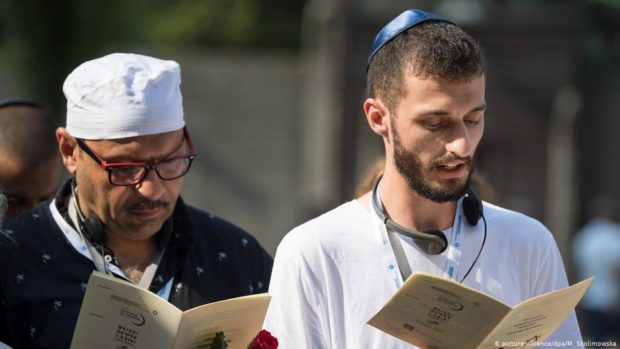

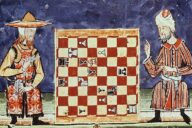
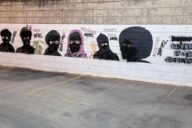










No Comments